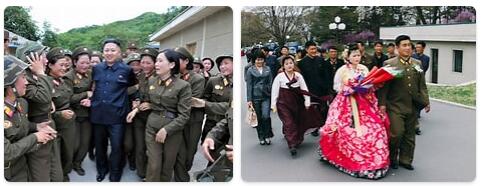Population
North Korea had an average population density of 211 residents per km 2 in 2019, but the settlement is concentrated to the coastal areas and the plains of southwestern North Korea. The country has a low population growth rate, which reflects recent years’ food shortages rather than state family planning. However, late marriages are encouraged.
The population is ethnically very homogeneous: 99.8 percent are Koreans. Movements are controlled very strictly. Between 1953 and 2000, only 5,000 North Koreans managed to get out of the country and into South Korea. During the 2000s, the emigration pressure has been periodically quite different. In 2003-04, a few hundred thousand North Koreans fled to China and then tried to move on to South Korea. However, a very small proportion of them succeeded. In China, North Koreans are not welcome.
Urbanization has been very fast since 1950; In 2017, 62 percent of the population lived in cities. The largest cities are the capital Pyongyang (3.4 million residents, 2012) and Hamhung – Hungnam (966,600).
For information on life expectancy and other demographic statistics, see Country facts.

Language
According to thesciencetutor, the official language is Korean. The dialectal differences between North Korea and South Korea are distinct but present no difficulties for mutual understanding. Even within the spelling, there are minor differences. The Chinese characters are completely abolished in North Korea. The Pyongyang dialect is the norm for the standard speech.
Religion
For religion in Korea before 1948 and domestic traditional religion in Korea, see Korea (Religion).
Due to the long conflict on the Korean Peninsula and the closure of North Korea, information on religion and religiosity is lacking. Of the statistics available (2010), almost 57% of the population are stated to be agnostic, almost 16% are atheists, about 13% are reported to be engaged in some form of neo-religiousness and slightly fewer (12%) are engaged in indigenous traditional religion. The Christians make up less than 1%. The majority of these are said to be independent as they do not belong to any established Christian church community. The number of Catholics is estimated to be about 40,000, and the number of Protestants to 3,500.
According to the North Korea Constitution of 2009, citizens are entitled to religious beliefs, the right to erect buildings for religious purposes and the right to hold religious ceremonies. But the same article (no. 68) states that religion must not be used as an argument for bringing in foreign powers or for damaging the state or social order. In practice, the regime suppresses religious activity in addition to certain religious organizations. These are officially recognized and controlled by the government.
In Pyongyang there are four Christian churches: two Protestant, one Catholic and one Russian Orthodox. The Russian Orthodox was established in 2006, at the initiative of Kim Jong Il, who had visited an Orthodox cathedral in the Russian Federation in 2002. The purpose of the church is to provide religious services to the Russians living in the country. One of the Protestants (Chilgol Church) is dedicated to Kim Il Sung’s mother, Kang Pan Sok, who was a Presbyterian deacon. Other religious organizations in the country are: Korean Christian Federation, Korean Buddhist Federation, Korean Roman Catholic Association (which is established by the government and has no links with the Vatican), Korean religious community and Chondonist community. Chondonismen(The religion of the heavenly road) has its roots in a peasant revolt in 1812. The movement is basically Confucian but with elements of Taoism and Buddhism. You deny a life after that. Instead, emphasis is placed on personal development and social welfare in this life; it is here and now that paradise is to be realized. The movement grew strongly during the 20th century.
According to data from 2010, there are an estimated 60 Buddhist temples in the country. Most of these are seen as cultural treasures, but in some religious activities are allowed. In recent years, some of the temples have been restored by state funds in an effort to preserve the Korean nation’s cultural heritage. In the country there are schools that train Protestant and Buddhist priests.
The prevailing political and philosophical ideology in North Korea is the juche (see further State Condition and Politics) developed by Kim Il Sung during the fight against the Japanese. Over time, juche has developed into a cult with strong religious traits with Kim Il Sung in the role of the country’s divine eternal leader.
There are no national religious holidays set by the government.
